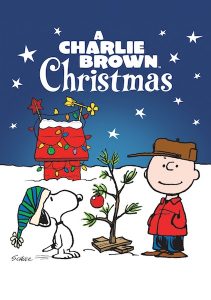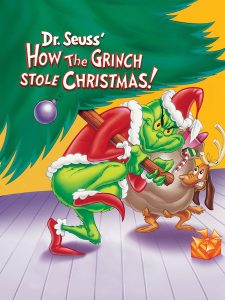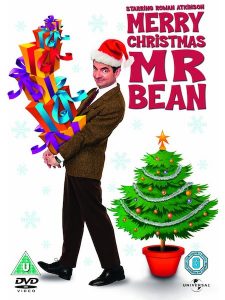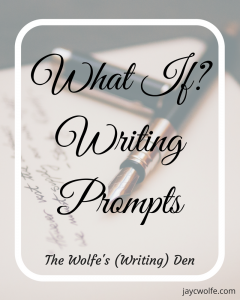by Naomi L. | December 20, 2017 | Blog, Creative Writing |
Christmas is almost here, which means it’s a great time to share some more forms of art related to holiday cheer! I’ve already written about my favorite Christmas stories and songs (twice) in the past, so this year I thought it would be fun to share a short post about my favorite Christmas specials! Of course, there are several to choose from, so maybe I’ll feature more in a future Christmas blog post!
So to celebrate the holiday season, here are three of my favorite Christmas specials! Enjoy, and Merry Christmas!
1) “A Charlie Brown Christmas” (1965)

I know, everyone adds this one to their list of favorite Christmas specials, but why wouldn’t they? It’s a classic! First broadcast in 1965, “A Charlie Brown Christmas” has been a holiday favorite for decades, and will probably continue to be one for generations to come.
Charlie Brown’s quest to understand the true meaning of Christmas communicates a timeless message of how the holiday spirit can easily be lost in materialism but still overcome it in the end. Linus’ speech about the story of Christmas and the heartwarming ending scene with Charlie Brown’s tiny Christmas tree have cemented this holiday special on my list of all-time favorites. Not to mention it has a phenomenal soundtrack! I now make it a point to listen to it every December. It’s the perfect music to get into the holiday spirit!
2) “How The Grinch Stole Christmas” (1966)

Dr. Seuss was a huge part of my childhood, so of course a classic Christmas special based on one of his books had to be on my list! Continuing on the same theme as “Charlie Brown”, “How The Grinch Stole Christmas” is another great story that criticizes the commercialization of Christmas and reminds us that the holiday season should be about so much more than presents and feasts.
For as long as I’ve been watching this special, the Grinch has always made me laugh with his antics, and I’m not ashamed to admit that I get a little choked up every time his heart grows three sizes and he embraces the true meaning of Christmas. With its fantastic story, animation, narration, and music, “How The Grinch Stole Christmas” is another holiday special for the ages!
3) “Merry Christmas, Mr. Bean” (1992)

Hey, I never said anything about listing my favorite American Christmas specials! I have so many fond memories of watching Mr. Bean with my sisters, and “Merry Christmas, Mr. Bean” was always one of our favorite episodes. From playing with a nativity scene to conducting a Christmas band to getting a turkey stuck on his head, Mr. Bean never failed to keep us laughing from beginning to end. Definitely a Christmas special worth watching!
What about you? What are some of your favorite Christmas specials?
by Naomi L. | December 18, 2017 | Blog, Word of the Week |
Word: mirth
Pronunciation: mərth
Part of Speech: noun
Definition: amusement, especially as expressed in laughter
Source: Oxford Dictionaries
The holiday season is in full swing once again, so what better vocabulary word to learn today than one related to joy? As fiction writers, we should always be equipped with a full arsenal of emotional words, but when our stories are set in happy times with plenty of amusement to go around, words like “laughter” and “cheerful” can become overused. It never hurts to know more positive and simple vocabulary, so instead of having your characters “laugh with joy” or “giggle with amusement”, why not sum up their excitement with a word like “mirth”?
“Mirth” is an expression of amusement, especially through laughter. The word comes from the Old English noun myrgth “mirth” and is Germanic in origin. This noun derives from the adjective mirige, meaning “pleasant” or “enjoyable”.
The word “mirth” shares its origin with the word “merry”, which also derives from the Old English adjective mirige. On the happiness spectrum, “mirth” generally refers to joy or amusement as expressed through laughter, as does its adjective form “mirthful”, so these may be good substitutes to turn to if you find yourself overusing the verb “laugh” and its synonyms. If you write jolly characters who often express their amusement out loud, “mirth” is a great word to include in your stories!
What are your thoughts on this word? Any suggestions for future “Word of the Week” featured words?
by Naomi L. | December 13, 2017 | Blog, Creative Writing |
As we reach the end of 2017, it’s a good time to look back on our achievements over the past year. Back in January, I set another goal to read 10 books for the Goodreads Reading Challenge, and though I’m still technically working on it, I’m optimistic about reaching my goal again!
So following two January posts on the ten books I wanted to read this year and a midyear progress report in July, here’s my final report on my reading challenge goals for 2017. Enjoy!

2017 Reading Goal: 10 books
Total books read in 2017: 8 books (80%)
Books I planned to read this year and did
- The Hunger Games, by Suzanne Collins
- A Game of Thrones, by George R.R. Martin
- Fahrenheit 451, by Ray Bradbury
- 1984, by George Orwell
Books I planned to read this year but didn’t
- Wuthering Heights, by Emily Brontë
- The Martian, by Andy Weir
- Shogun, by James Clavell
- The Road, by Cormac McCarthy
- StarTalk, by Neil deGrasse Tyson
Books I read this year but didn’t plan to
- I Am Pusheen the Cat, by Claire Belton
- High Performance Paperback, by Ray Brehm and Jim Molinelli
- You Are A Writer, by Jeff Goins
- The Adventure, by Jennifer M Zeiger
Books I’m still reading
- Ready Player One, by Ernest Cline
- Creating Character Arcs, by K.M. Weiland
- The Business of Writing & Editing, by Sagan Morrow
And last but not least…
My Favorite Book of the Year: 1984, by George Orwell
What about you? Did you set any reading goals this year? Were you able to meet them? What were your favorite books of the year?
by Naomi L. | December 11, 2017 | Blog, Word of the Week |
Word: sententious
Pronunciation: sen-TEN-(t)shəs
Part of Speech: adjective
Definition: given to moralizing in a pompous or affected manner
Source: Oxford Dictionaries
“Thoughtcrime is a dreadful thing, old man,” he said sententiously.
– 1984, George Orwell (1949)
If it isn’t already obvious by the first word in the given example, I learned today’s Word of the Week from George Orwell’s famous novel 1984. The above excerpt is from a conversation between Winston, the Party-hating protagonist, and Parsons, his Party-loving neighbor. Without going into too much detail about why they’re discussing thoughtcrime, this line shows the latter is only too eager to call it out as the worst thing that can happen to a person. He may be dull, but given his extreme loyalty to the Party, it only makes sense that Parsons would be so “sententious” about this subject!
A “sententious” act is one that moralizes in an affected or pompous way. The word arose in late Middle English and comes from the Latin adjective sententiosus, which derives from the noun sententia, meaning “opinion”. This noun stems from the verb sentire, which means “to feel”.
Interestingly, the original definition of “sententious” was “full of meaning or wisdom”, but this meaning eventually became obsolete and the word since took on a depreciatory sense. To a lesser extent, “sententious” can also be used as a synonym for “pithy” or “concise”, though it’s unclear how common this use is. If your characters often moralize issues in a pompous or self-important way, “sententious” may be a good word to use in your stories!
What are your thoughts on this word? Any suggestions for future “Word of the Week” featured words?
by Naomi L. | December 6, 2017 | Blog, Creative Writing, What If? Writing Prompts |
December is here! Another year has come and gone, and with the holiday season about to shift into high gear, it’s a great time for some more “What If?” Writing Prompts! This week’s batch of prompts once again centers around the theme of the holidays. See what holiday stories you can write from these ideas! Enjoy!
 What if… instead of giving presents, Christmas centered around a tradition of doing good deeds?
What if… instead of giving presents, Christmas centered around a tradition of doing good deeds?
What if… your family only celebrated a made-up non-commercial holiday like Festivus in December?
What if… you received a mysterious Christmas present from a relative who had passed away?
What if… one Hanukkah, you and your family played a mystery game in which you’d get one new clue every night until someone won?
What if… every year, at the stroke of midnight on New Year’s Eve, you had the power to make it January 1st of any year in history, but had to live that entire year until the following New Year’s Eve?
Good luck writing more stories about the holidays!
If you have any “What If?” writing prompt suggestions (for any theme), please feel free to share them in the comments below. Ideas I like may be featured in future “What If?” posts, with full credit and a link to your blog (if you have one)! Also, if you’ve written a piece based on an idea you’ve found here, be sure to link back to the respective “What If?” post. I would love to see what you’ve done with the prompt! Thank you!
by Naomi L. | December 4, 2017 | Blog, Word of the Week |
Word: augur
Pronunciation: AW-ɡər
Part of Speech: verb
Definition: (of an event or circumstance) portend a good or bad outcome
Source: Oxford Dictionaries
Here’s an interesting word I found while searching for a synonym for “foreshadow”. You may recognize today’s Word of the Week as part of another more familiar word (which I featured in this segment earlier this year), though their meanings are considerably different. While it’s not exactly common, I’m sure we could all find a use for this word now and then; in such an unpredictable world, the least we can hope for is to determine if current events will “augur” well or badly for the future!
To “augur” is to foreshadow a good or bad outcome. The word arose in late Middle English and is originally a Latin noun meaning “diviner”. This noun’s origin is uncertain, but it’s related to the verb augurare, which means “to predict”.
When used in its primary sense, “augur” should be followed by an adverb describing the predicted outcome (e.g. to “augur well” or “augur badly”), though it can also be followed by the prediction itself (e.g. to “augur the end of the war”). The word also functions as a historical noun; in Ancient Rome, an “augur” was “a religious official who observed natural signs, especially the behavior of birds, interpreting these as an indication of divine approval or disapproval of a proposed action”. It should not be confused with the noun “auger”, which means “a tool with a helical bit for boring holes in wood”. If your stories involve a lot of foreshadowing of good or bad events, “augur” may be an excellent addition to your vocabulary!
What are your thoughts on this word? Any suggestions for future “Word of the Week” featured words?





 What if… instead of giving presents, Christmas centered around a tradition of doing good deeds?
What if… instead of giving presents, Christmas centered around a tradition of doing good deeds?
Recent Comments